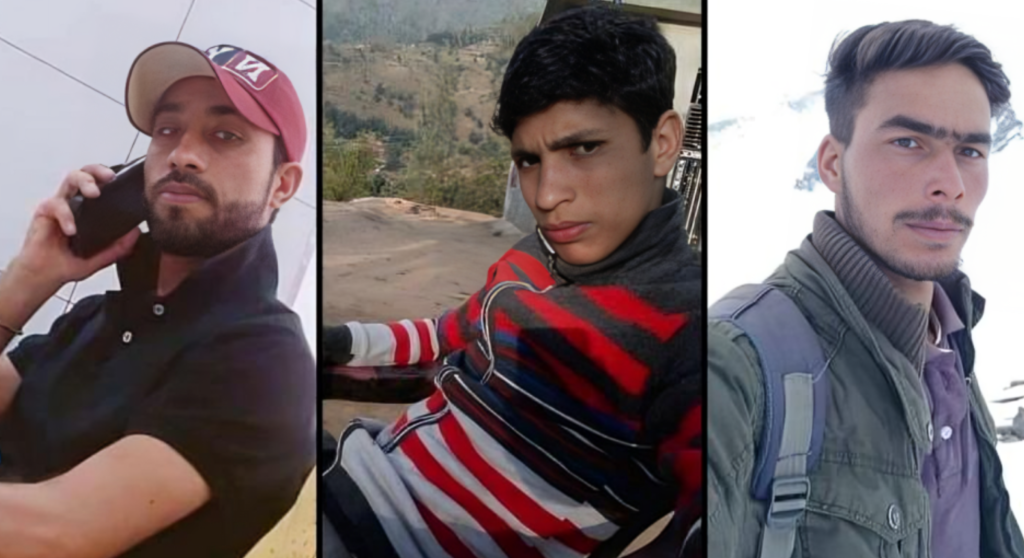
Amishipora Fake Encounter and the World of Impunity in Kashmir
Muhammad Muneeb
The story of fake encounters is a haunting and persistent reality in Kashmir. From the beginning, the Indian military has systematically killed Kashmiris, often labeling them as foreign “terrorists” with long, fabricated aliases. The use of these aliases has become so routine that whenever the occupying army, in their press releases, announces the names of the dead after an alleged gunfight, Kashmiris immediately grow suspicious. This suspicion is heartbreakingly confirmed time and again. Commonly used aliases such as Haider, Abu Talha, Dawood Bhai, and Abu Hanzala now signify, for Kashmiris, a disturbing and grotesque reality.
A few years ago, during the summer, news broke of an alleged gunfight in which two Pakistani “militants” were reportedly killed in the Uri area of Baramullah district, north of Kashmir. My aunt, in a state of panic, searched frantically for her phone and began calling her son, who had left home earlier, stating he was headed to a tourist destination in the same district. This was neither an overreaction nor confusion on her part. My own heart began to race when my cousin brother did not answer multiple calls. Only when he finally called back could we all breathe a sigh of relief. This perpetual state of fear and anxiety that families in Kashmir live in is sadly a reality. Kashmiris know well that their loved ones can be arbitrarily labeled and killed by the military, with the truth obscured under layers of lies.
The Indian military is incentivized with monetary rewards and promotions to kill Kashmiri fighters. Since the beginning of the armed resistance movement, they have killed Kashmiris indiscriminately, fully aware that draconian laws like the Armed Forces Special Powers Act (AFSPA) protect them. These laws provide them with immunity and ensure that even after killing non-combatants, they face no repercussions but are instead rewarded and promoted to higher positions. This impunity allows them to commit such dastardly and horrendous acts with ease, as they view the entire Kashmiri population as enemies and their bodies as killable. Innocent and unarmed civilians are killed without any remorse here.
On 18 July 2020, three laborers from Rajouri area of Jammu and Kashmir were killed in a fake encounter by the Indian Army in Amshipora, Shopian. Captain Bhoopendra Singh, who orchestrated this fake encounter along with his men, was found guilty. Their motive was to obtain cash rewards and promotions. To pacify the outraged public and give an illusion of accountability and justice, the military administration sentenced him to life imprisonment. However, in November 2023, an armed forces tribunal granted bail to Captain Singh and allowed him to roam free despite perpetrating the chilling act of killing civilians in a fake encounter. It is important to note that no military officer has ever been convicted in any fake encounter in the region. Not only in cases of fake encounters, but these mercenaries have also evaded justice in numerous other cases, including the rape of Kashmiri women, killing Kashmiris under torture, enforced disappearances, and other war crimes.
One example of this impunity is the Shopian double rape and murder case. In 2009, two young Kashmiri women were brutally raped and murdered. Despite overwhelming evidence and the initial postmortem report confirming the brutal rape and murder, no one was held accountable. Years later in 2023, the doctors who conducted the postmortem and stated the facts were suspended. India has systematically used rape as a weapon of war to crush the resistance movement in the region. There are countless instances where Kashmiri fathers, brothers, and husbands were forced to witness the horrendous acts of rape committed against their daughters, sisters, and wives. This state of impunity has emboldened the occupational apparatuses to use every dirty and brutal tactic to crush the popular sentiment and break the resolve of Kashmiris.
It is not surprising that the victims of such brutal acts never receive justice in Kashmir. The region is under brutal fascist military control, and the only true justice will be when Kashmiris achieve their freedom and the last mercenary soldier withdraws from the occupied territory. Until then, the stories of fake encounters, rapes, disappearances, and murders will, unfortunately, continue to be a grim reminder of the unimaginable oppression faced by the people of Kashmir. Only through the end of this occupation can there be hope for peace, dignity, and justice for the long-suffering people of this god-forsaken region.
Editor's Pick
Recent Reviews
Socials Share
Facebook
Twitter
LinkedIn



